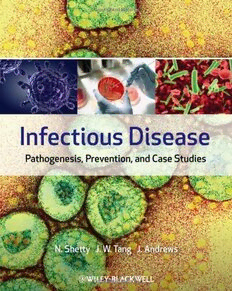
Infectious Disease - Pathogenesis, Prevention, and Case Studies PDF
691 Pages·2009·78.732 MB·English
Most books are stored in the elastic cloud where traffic is expensive. For this reason, we have a limit on daily download.
Preview Infectious Disease - Pathogenesis, Prevention, and Case Studies
Description:
“… a fun and readable book that engages the imagination and retains the interest of the clinically oriented reader while conveying an understanding of the direct implications of molecular characteristics of infectious agents to the practice of medicine..” –Emerging Infectious Diseases, January 2010“… provides a valuable overview of the basic principles and issues pertaining to the pathogenesis and prevention of infectious diseases. The illustrations, the chapter summaries with relevant information, and the case studies are all particularly useful for the targeted readers. The book is well designed and manages to convey the general concepts of the various aspects of infectious diseases without overwhelming the reader with too much information… recommended for students, trainees, or physicians who desire a well-illustrated textbook that is easy to read and that addresses the basic aspects of infectious disease.” –Clinical Infectious Diseases, 2010The study of infectious diseases has undergone major changes since its infancy when it was largely a documentation of epidemics. It has now evolved into a dynamic phenomenon involving the ecology of the infectious agent, pathogenesis in the host, reservoirs and vetors, as well as the complex mechanisms concerned in the spread of infection and the extent to which this spread occurs. Rapid globalization has led to unprecedented interest in infectious diseases worldwide and their effect on complex population dynamics including migration, famine, fire, war, and terrorism. It is now essential for public health officials to understand the basic science behind infectious disease and, likewise, students studying ID must have a broader understanding of the implications of infectious disease in a public health context as well as clinical presentation and prevention. The clear demand for an integrated approach has led to the publication of this text.Check out the student companion site at www.wiley.com/go/shettyinfectiousdisease
See more
The list of books you might like
Most books are stored in the elastic cloud where traffic is expensive. For this reason, we have a limit on daily download.
